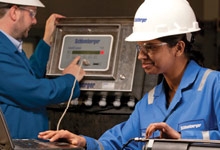- Home page /
- New technologies and equipment /
- Intelligent Completions - A Smart Choice
Intelligent Completions - A Smart Choice
14.02.2012

Intelligent completions are a mature technology whose development was originally driven by the desire to avoid costly well interventions. Over time, engineers discovered they could optimize production and eliminate many of the risks and costs associated with intervention by using the remote monitoring and control capabilities of intelligent completions.
Today, operators perceive conventional intelligent completions as complex, high capital expenditure items. As a result, they are deployed primarily in wells and fields with multiple high-production zones and long-life expectancies.
Recently, engineers at Schlumberger designed the IntelliZone Compact modular multizonal management system. This integrated system requires significantly less initial investment and less rig time to deploy than traditional intelligent completions, making it ideal for lower-tier and brownfield applications.
This new system brings the benefits of remote monitoring and control to a wider market. Because of its modular design, the new system is half the length of a conventional intelligent completion and is built and tested before delivery. Unlike intelligent completions that require extensive work at the rig site prior to installation, the IntelliZone Compact system requires only minimal electric and hydraulic connections on site - greatly reducing rig time, cost, and operational risk.
In Brazil, this new intelligent completion technology allowed Petrobras to affordably maximize production from a mature field in the Campos basin. By replacing single-zone wells completed conventionally with three-zone wells using the IntelliZone Compact system, the operator optimized production at 165% of the expected rate.
Offshore East Malaysia, engineers at PETRONAS seeking to reduce well count offshore controlled inflow using the IntelliZone Compact system. Because the system was preassembled and few connections were made on location, installation was 66% faster per zone than with conventional installations, translating roughly to USD 400,000 per well.

